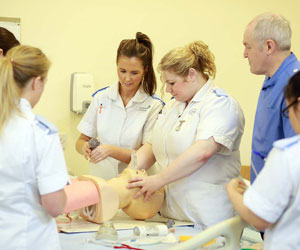Course outline
Course summary
We provide a stimulating and challenging academic and scholarly environment for you to advance your academic and professional development beyond undergraduate level.
We will enable you to develop a mastery of complex and specialised knowledge and a critical awareness of issues at the forefront of paramedic practice. You will develop conceptual knowledge and advanced understanding of how techniques of enquiry enable the critical and objective analysis, interpretation and application of research and evidence within pre-hospital and emergency care. Through completion of a dissertation, you will challenge existing knowledge and develop new ideas and ways of thinking.
Modules
Core Module
- Negotiated Learning [ 20 credits ]
Optional Modules
- Leadership Through Transformational Learning [ 20 credits ]
- Clinical Reasoning and Assessment Skills in Healthcare (CRASH) [ 20 credits ]
- Emergency Clinical Decision Making and Problem Solving [ 20 credits ]
- Clinical Complexity in Emergency Care [ 20 credits ]
- Emergency Care of Women and Children [ 20 credits ]
- Disaster Response [ 20 credits ]
- Safety and Security for Humanitarian, Disaster Response and Development Workers [ 20 credits ]
- Humanitarian Action [ 20 credits ]
- Advancing Mental Health Across The Healthcare Spectrum (Advanced Level) [ 20 credits ]
- Advanced Pathophysiology and Diseases in Practice [ 20 credits ]
- Care of Minor Illness and Minor Injuries [ 20 credits ]
- Management of Major Illness and Major Trauma [ 20 credits ]
- Acute and Critical Care: Foundations for Practice [ 20 credits ]
- Acute Care: Contemporary Issues Independent Study [ 20 credits ]
- Acute Care: Initial Management of the Acutely Ill Adult [ 20 credits ]
- Patient Safety in Acute and Critical Care [ 20 credits ]
- Consultation and Physical Examination: Health Assessment Skills [ 20 credits ]
- Optional – But if chosen, all 3 modules must be taken and passed. Refer to the ‘Notes’ section below for details
- Pharmacology for Prescribing [ 10 credits ]
- Developing Clinical Skills for Non-Medical Prescribing through Work Based Learning [ 10 credits ]
- Principles of Prescribing Practice in the Context of Allied Health Professionals (Independent/Supplementary Prescribing) [ 20 credits ]
- Clinical Supervision [ 20 credits ]
- Multiprofessional Support of Learning and Assessment in Practice [ 20 credits ]
- Coaching and Mentoring [ 20 credits ]
- Managing Within a Strategic and Organisational Context [ 20 credits ]
- Introduction to Teaching, Learning and Assessment [ 20 credits ]
- Researching Academic Practice [ 20 credits ]
- Curriculum Design and Development [ 20 credits ]
- Research Methods [ 20 credits ]
- Work Based Learning [ 20 credits ]
Programme Specification
Assessment, Feedback, and Teaching and Learning methods
Timetables
Entry requirements
Entry Requirements
1st or 2nd class honours degree.
Students with other qualifications may be admitted to the course, please contact the Enquiry Centre for further details.
Accreditation of Prior Learning (APL) may be considered for relevant prior learning at the same academic level.
Selection Criteria
- For applicants who do not meet this requirement, non-standard entry criteria will apply; in such cases applicants will be interviewed. This decision will be at the discretion of the programme leader. It is expected that such candidates will have evidence of successful study at level 6 (or equivalent) within the preceding 5 years.
- To access this course you must be a qualified paramedic, registered with the Health and Care Professions Council or an equivalent and presently working in an emergency ambulance service or similar accident and emergency/first contact health care practice environment. You will need to provide a statement from your current employer who must make reference to your professional competence.
Application information
Making your application
Applications should be made online directly to the university; visit our website or contact enquirycentre@cumbria.ac.uk for details and guidance. There is no official closing date but we would encourage you to apply as early as possible, as many courses are competitive.
What makes a good application?
We consider all aspects of your application, not simply your qualifications and grades. We look at your academic background and performance, relevant experience (particularly for professional courses where some voluntary or paid experience is required) and your reference. Above all, we look for motivation, commitment and potential-evidence that you can benefit from study at higher education level.
Make sure you include:
- Relevant qualifications/evidence of ability: check our website for the specific entry requirements required for each course. Tell us your previous academic results and your projected grades.
- A supportive reference, from an employer or your school or college.
- A good personal statement.
- Explain clearly what attracts you to the course and tell us about your wider interests and experience. If you are applying for a course that incorporates professional training and placements, you should include any relevant experience or visits you have made in the workplace. Highlight your individual strengths and qualities, personal skills, capacity for teamwork, contribution to the community and your enterprise, originality and determination. Select some activities which bring out these qualities.
What next?
When we receive your application, we will send you an acknowledgement and if you are successful at this stage you will get either an offer (with an invitation to visit the campus to which you have applied), or an invitation to interview on a particular date. If we are not able to offer you a place on your chosen course we will usually try to offer you a place on a similar course and will contact you to discuss this. Alternatively, if we think you are suitable, but cannot offer you a place on your preferred campus because of the level of competition, we will offer you a place at another campus if one is available.
And if I accept?
The admissions team will contact you and send further information from February onwards about accommodation, and from May/June onwards about preparing to join the university. If you have any other queries, please telephone the admissions offices for information and advice on 0845 6061144.
Deferred entry
We welcome applications for deferred entry on some courses. If you have specific plans during your year out, indicate these on your personal statement as they may be relevant to your course and could enhance your application.
International students
Applications for full-time undergraduate study are made through UCAS. Please see the of our website for full details of our entry requirements (including English-language skills) as well as contacts for advice and support.
From 2009 the UK Border Agency introduced a Points-Based Immigration System (PBS) for students coming to the UK from outside the European Economic Area (EEA). Students entering higher education will need to obtain a Confirmation of Acceptance (CAS) plus finance confirmation to obtain a Tier 4 student visa. UK education providers are licensed by the UK Border Agency. When students apply for their visa (or entry clearance) they will need a valid Certificate of Acceptance of Studies from the university. Please note that a CAS is not a guarantee that a visa will be issued.






